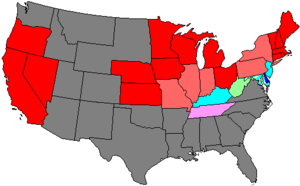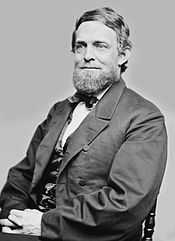| 39th United States Congress | |
|---|---|
| 38th ←→ 40th | |
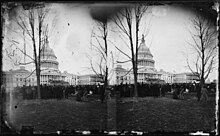 United States Capitol (1877) United States Capitol (1877) | |
March 4, 1865 – March 4, 1867 | |
| Members | 54 senators 193 representatives 9 non-voting delegates |
| Senate majority | Republican |
| Senate President | Andrew Johnson (D/NU) (until April 15, 1865) Vacant (from April 15, 1865) |
| House majority | Republican |
| House Speaker | Schuyler Colfax (R) |
| Sessions | |
| Special: March 4, 1865 – March 11, 1865 1st: December 4, 1865 – July 28, 1866 2nd: December 3, 1866 – March 4, 1867 | |
The 39th United States Congress was a meeting of the legislative branch of the United States federal government, consisting of the United States Senate and the United States House of Representatives. It met in Washington, D.C., from March 4, 1865, to March 4, 1867, during Abraham Lincoln's final month as president, and the first two years of the administration of his successor, Andrew Johnson.
The apportionment of seats in this House of Representatives was based on the 1860 United States census. Both chambers had a Republican majority.
Major events
Main articles: 1865 in the United States, 1866 in the United States, and 1867 in the United States- March 4, 1865: Second inauguration of President Abraham Lincoln.
- April 9, 1865: Surrender of Confederate forces at Appomattox Court House, effectively ending the American Civil War
- April 15, 1865: Assassination of President Abraham Lincoln, Vice President Andrew Johnson became President of the United States
- December 11, 1865: Creation of the House Appropriations Committee and the House Banking and Commerce Committee, reducing the tasks of the House Ways and Means Committee
- January, 1866: The second and current United States Capitol dome completed after 11 years of work.
- July 24, 1866: Tennessee became the first U.S. state to be readmitted to the Union following the American Civil War.
- November 5, 1866: United States House of Representatives elections, 1866
- January 8, 1867: African American men are granted the right to vote in the District of Columbia
Major legislation
Main article: List of United States federal legislation in the 39th Congress- April 9, 1866: Civil Rights Act of 1866, Sess. 1, ch. 31, 14 Stat. 27
- July 16, 1866: Freedmen's Bureau Bill, Sess. 1, ch. 200, 14 Stat. 173
- July 23, 1866: Judicial Circuits Act, Sess. 1, ch. 210, 14 Stat. 209, reduced the number of United States circuit courts to nine and the number of Supreme Court justices to seven
- July 23, 1866: District of Columbia Public Schools Act ("An Act relating to Public Schools in the District of Columbia"), Sess. 1, ch. 217, 14 Stat. 216
- July 25, 1866: An Act to revive the grade of General in the United States Army, Sess. 1, ch. 232, 14 Stat. 223, (now called "4-star general"); Lieutenant General Ulysses S. Grant became the first to have this rank.
- July 28, 1866: Metric Act of 1866, Sess. 1, ch. 301, 14 Stat. 339, legalized the use of the metric system for weights and measures in the United States.
- July 28, 1866: Washington City Colored Schools Lots Donation Act ("An Act donating certain Lots in the City of Washington for Schools for Colored Children in the District of Columbia"), Sess. 1, ch. 308, 14 Stat. 343
- March 2, 1867: Reconstruction Act, ch. 153, 14 Stat. 428 established five military districts, each headed by a general, in ten states of the former Confederate South (Tennessee excepted), and stipulates conditions for re-admission of these States into the Union.
- March 2, 1867: Tenure of Office Act, ch. 154, 14 Stat. 430 required the president to obtain the Senate's advice and consent to suspend or dismiss certain federal public officials (notably cabinet officers). Violation of this act will lead to the impeachment of Andrew Johnson by the next (40th) Congress in 1868.
Constitutional amendments
- December 18, 1865: Thirteenth Amendment to the United States Constitution declared ratified
- June 13, 1866: Approved an amendment to the Constitution addressing citizenship rights and equal protection of the laws, and submitted it to the state legislatures for ratification
- Amendment was later ratified on July 9, 1868, becoming the Fourteenth Amendment to the United States Constitution
States admitted
- July 24, 1866: Tennessee readmitted to representation.
- March 1, 1867: Nebraska admitted as the 37th state, sess. 2, ch. 36, 14 Stat. 391 (over president's veto)
Party summary
The count below identifies party affiliations at the beginning of the first session of this Congress, and includes members from vacancies and newly admitted states, when they were first seated. Changes resulting from subsequent replacements are shown below in the "Changes in membership" section.
Senate
During this Congress, two seats were added for the new state of Nebraska.
| Party (shading shows control) |
Total | Vacant | ||||
|---|---|---|---|---|---|---|
| Democratic (D) |
Republican (R) | Unionist (U) | Unconditional Unionist (UU) |
|||
| End of previous congress | 10 | 33 | 3 | 4 | 50 | 22 |
| Begin | 9 | 37 | 1 | 1 | 48 | 24 |
| End | 8 | 41 | 3 | 2 | 54 | 20 |
| Final voting share | 14.8% | 75.9% | 5.6% | 3.7% | ||
| Beginning of next congress | 8 | 45 | 0 | 0 | 53 | 21 |
House of Representatives
During this Congress, one seat was added for the new state of Nebraska.
| Party (shading shows control) |
Total | Vacant | ||||||
|---|---|---|---|---|---|---|---|---|
| Democratic (D) |
Republican (R) | Independent Republican (IR) | Unionist (U) | Unconditional Unionist (UU) | Other |
|||
| End of previous congress | 72 | 84 | 2 | 9 | 16 | 0 | 183 | 56 |
| Begin | 40 | 132 | 1 | 0 | 10 | 0 | 183 | 59 |
| End | 39 | 135 | 4 | 13 | 192 | 51 | ||
| Final voting share | 20.3% | 70.3% | 0.5% | 2.1% | 6.8% | 0.0% | ||
| Beginning of next congress | 45 | 140 | 1 | 0 | 0 | 2 | 188 | 55 |
Leadership

Andrew Johnson, until April 15, 1865
Senate
- President: Andrew Johnson (D), until April 15, 1865; vacant thereafter.
- President pro tempore: Lafayette S. Foster (R), until March 2, 1867
- Benjamin F. Wade (R), elected March 2, 1867
- Republican Conference Chairman: Henry B. Anthony
House of Representatives
Members
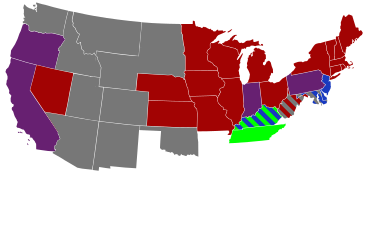
This list is arranged by chamber, then by state. Senators are listed in order of seniority, and representatives are listed by district.
Senate
Senators were elected by the state legislatures every two years, with one-third beginning new six-year terms with each Congress. Preceding the names in the list below are Senate class numbers, which indicate the cycle of their election. In this Congress, Class 1 meant their term began in the last Congress, requiring reelection in 1868; Class 2 meant their term began in this Congress, requiring reelection in 1870; and Class 3 meant their term ended in this Congress, requiring reelection in 1866.
Alabama
Arkansas
California
Connecticut
Delaware
Florida
Georgia
Illinois
Indiana
Iowa
Kansas
Kentucky
Louisiana
Maine
Maryland
Massachusetts
Michigan
Minnesota
Mississippi
|
Missouri
Nebraska
Nevada
New Hampshire
New Jersey
New York
North Carolina
Ohio
Oregon
Pennsylvania
Rhode Island
South Carolina
Tennessee
Texas
Vermont
Virginia
West Virginia
Wisconsin
|
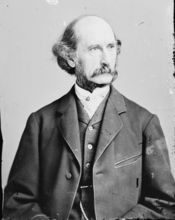 Lafayette S. Foster, until March 2, 1867 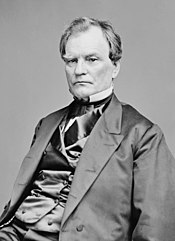 Benjamin Wade, from March 2, 1867
|
House of Representatives
The names of members of the House of Representatives are preceded by their district numbers.
Changes in membership
The count below reflects changes from the beginning of the first session of this Congress.
Senate
- Replacements: 8
- Democratic: 2-seat net loss
- Republican: 2-seat net gain
- Unionist: no net change
- Unconditional Union: no net change
- Deaths: 4
- Resignations: 2
- Vacancy: 1
- Seats of newly admitted states: 2
- Seats of re-admitted states: 2
- Total seats with changes: 12
| State (class) |
Vacated by | Reason for change | Successor | Date of successor's formal installation |
|---|---|---|---|---|
| Maryland (3) | Vacant | Sen. Thomas Hicks had died during previous congress. Successor elected March 9, 1865. |
John Creswell (UU) | March 9, 1865 |
| New Jersey (2) | Vacant | Although elected in time for this Congress, the Senator-elect was not seated until March 15, 1865. Senator was later removed in election dispute, see below. |
John P. Stockton (D) | March 15, 1865 |
| Tennessee (2) | Vacant | Tennessee re-admitted to the Union. Senators were elected July 24, 1866. |
Joseph S. Fowler (U) | July 24, 1866 |
| Tennessee (1) | David T. Patterson (U) | July 28, 1866 | ||
| Iowa (3) | James Harlan (R) | Resigned May 15, 1865, after being appointed U.S. Secretary of the Interior. Successor elected January 13, 1866. |
Samuel J. Kirkwood (R) | January 13, 1866 |
| Vermont (3) | Jacob Collamer (R) | Died November 9, 1865. Successor was appointed November 21, 1865, to continue the term. Appointee was elected October 24, 1866, to finish the term. |
Luke P. Poland (R) | November 21, 1865 |
| New Jersey (2) | John P. Stockton (D) | Disputed election led to Senate vacating the seat March 27, 1866. Successor elected September 19, 1866. |
Alexander G. Cattell (R) | September 19, 1866 |
| Vermont (1) | Solomon Foot (R) | Died March 28, 1866. Successor was appointed April 3, 1866, to continue the term. Appointee was elected October 24, 1866, to finish the term. |
George F. Edmunds (R) | April 3, 1866 |
| Kansas (2) | Jim Lane (R) | Died July 11, 1866, after being mortally wounded from a self-inflicted gunshot 10 days earlier Successor was appointed July 19, 1866, to continue the term. Appointee was elected January 23, 1867, to finish the term. |
Edmund G. Ross (R) | July 19, 1866 |
| New Hampshire (3) | Daniel Clark (R) | Resigned July 27, 1866, after being appointed Judge of the U.S. District Court for the District of New Hampshire. Successor was appointed August 31, 1866. |
George G. Fogg (R) | August 31, 1866 |
| New Jersey (1) | William Wright (D) | Died November 1, 1866. Successor was appointed November 12, 1866. Appointee was elected January 23, 1867, to finish the term. |
Frederick T. Frelinghuysen (R) | November 12, 1866 |
| Nebraska (1) | New seat | Nebraska admitted to the Union March 1, 1867. | Thomas Tipton (R) | March 1, 1867 |
| Nebraska (2) | John M. Thayer (R) |
House of Representatives
- Replacements: 9
- Democratic: 1-seat net gain
- Republican: 2-seat net gain
- Unconditional Unionist: 1 seat net loss
- Unionist: 0 net change
- Deaths: 4
- Resignations: 4
- Contested election: 3
- Seats from newly admitted states: 1
- Seats from re-admitted states: 8
- Total seats with changes: 21
| District | Vacated by | Reason for change | Successor | Date of successor's formal installation |
|---|---|---|---|---|
| Tennessee 1st | Vacant | Tennessee re-admitted into the Union | Nathaniel G. Taylor (U) | July 24, 1866 |
| Tennessee 2nd | Horace Maynard (UU) | |||
| Tennessee 3rd | William B. Stokes (UU) | |||
| Tennessee 4th | Edmund Cooper (U) | |||
| Tennessee 5th | William B. Campbell (U) | |||
| Tennessee 6th | Samuel M. Arnell (UU) | |||
| Tennessee 7th | Isaac R. Hawkins (U) | |||
| Tennessee 8th | John W. Leftwich (UU) | |||
| Maryland 2nd | Edwin H. Webster (UU) | Resigned some time in July, 1865 after being appointed Collector of Customs for the port of Baltimore | John L. Thomas Jr. (UU) | December 4, 1865 |
| New York 16th | Orlando Kellogg (R) | Died August 24, 1865 | Robert S. Hale (R) | December 3, 1865 |
| Massachusetts 6th | Daniel W. Gooch (R) | Resigned September 1, 1865, after being appointed Navy Agent for the port of Boston | Nathaniel P. Banks (R) | December 4, 1865 |
| Pennsylvania 16th | Vacant | incumbent Coffroth prevented from taking seat due to election contest | Alexander H. Coffroth (D) | February 19, 1866 |
| Pennsylvania 16th | Alexander H. Coffroth (D) | Lost contested election July 18, 1866 | William H. Koontz (R) | July 18, 1866 |
| Indiana 7th | Daniel W. Voorhees (D) | Lost contested election February 23, 1866 | Henry D. Washburn (R) | February 23, 1866 |
| New York 8th | James Brooks (D) | Lost contested election April 7, 1866 | William E. Dodge (R) | April 7, 1866 |
| New York 3rd | James Humphrey (R) | Died June 16, 1866 | John W. Hunter (D) | December 4, 1866 |
| Kentucky 6th | Green C. Smith (UU) | Resigned some time in July, 1866 after being appointed Governor of the Montana Territory. | Andrew H. Ward (D) | December 3, 1866 |
| Kentucky 5th | Lovell Rousseau (UU) | Resigned July 21, 1866, after being reprimanded for his assault of Iowa Rep. Josiah B. Grinnell. Was re-elected to fill his own seat. | Lovell Rousseau (UU) | December 3, 1866 |
| Kentucky 3rd | Henry Grider (D) | Died September 7, 1866 | Elijah Hise (D) | December 3, 1866 |
| Pennsylvania 11th | Philip Johnson (D) | Died January 29, 1867 | Vacant | Not filled this term |
| Nebraska Territory At-large | Phineas Hitchcock (R) | Nebraska achieved statehood March 1, 1867 | District eliminated | |
| Nebraska At-large | New State | Nebraska admitted to the Union March 1, 1867. Seat remained vacant until March 2, 1867 | Turner M. Marquette (R) | March 2, 1867 |
Committees
Lists of committees and their party leaders for members of the House and Senate committees can be found through the Official Congressional Directory at the bottom of this article. The directory after the pages of terms of service lists committees of the Senate, House (Standing with Subcommittees, Select and Special) and Joint and, after that, House/Senate committee assignments. On the committees section of the House and Senate in the Official Congressional Directory, the committee's members on the first row on the left side shows the chairman of the committee and on the right side shows the ranking member of the committee.
Senate
- Agriculture (Chairman: John Sherman)
- Audit and Control the Contingent Expenses of the Senate (Chairman: George H. Williams)
- Claims (Chairman: Timothy O. Howe)
- Coins, Weights and Measures (Select)
- Commerce (Chairman: Zachariah Chandler)
- Compensation (Select)
- Distributing Public Revenue Among the States (Select)
- District of Columbia (Chairman: Lot M. Morrill)
- Engrossed Bills (Chairman: Aaron H. Cragin)
- Finance (Chairman: William P. Fessenden)
- Foreign Relations (Chairman: Charles Sumner)
- Indian Affairs (Chairman: John B. Henderson)
- Interior Department Clerical Force (Select)
- Judiciary (Chairman: Lyman Trumbull)
- Manufactures (Chairman: William Sprague IV)
- Military Affairs and the Militia (Chairman: Henry Wilson)
- Mines and Mining (Chairman: John Conness)
- Mississippi River Levees Reconstruction (Select)
- National Banks (Select)
- National Telegraph Company (Select)
- Naval Affairs (Chairman: James W. Grimes)
- Ordnance and War Ships (Select)
- Pacific Railroad (Chairman: Jacob M. Howard)
- Patents and the Patent Office (Chairman: Waitman T. Willey)
- Pensions (Chairman: Henry S. Lane)
- Post Office and Post Roads (Chairman: Alexander Ramsey)
- Private Land Claims (Chairman: Ira Harris)
- Public Buildings and Grounds (Chairman: B. Gratz Brown)
- Public Lands (Chairman: Samuel C. Pomeroy)
- Retrenchment
- Revolutionary Claims (Chairman: Richard Yates)
- Tariff Regulation (Select)
- Territories (Chairman: Benjamin F. Wade)
- Whole
House of Representatives
- Accounts (Chairman: Edward H. Rollins)
- Agriculture (Chairman: John Bidwell)
- Appropriations (Chairman: Thaddeus Stevens)
- Banking and Currency (Chairman: Theodore M. Pomeroy)
- Claims (Chairman: Columbus Delano)
- Coinage, Weights and Measures (Chairman: John A. Kasson)
- Commerce (Chairman: Elihu B. Washburne)
- District of Columbia (Chairman: Ebon C. Ingersoll)
- Elections (Chairman: Henry L. Dawes)
- Expenditures in the Interior Department (Chairman: Ebenezer Dumont)
- Expenditures in the Navy Department (Chairman: George W. Julian)
- Expenditures in the Post Office Department (Chairman: Jehu Baker)
- Expenditures in the State Department (Chairman: Frederick A. Pike)
- Expenditures in the Treasury Department (Chairman: James M. Marvin)
- Expenditures in the War Department (Chairman: Henry C. Deming)
- Expenditures on Public Buildings (Chairman: John W. Longyear)
- Foreign Affairs (Chairman: Nathaniel P. Banks)
- Freedmen's Affairs (Chairman: Thomas D. Eliot)
- Indian Affairs (Chairman: William Windom)
- Invalid Pensions (Chairman: Sidney Perham)
- Judiciary (Chairman: James F. Wilson)
- Manufactures (Chairman: James K. Moorhead)
- Mileage (Chairman: George W. Anderson)
- Military Affairs (Chairman: Robert C. Schenck)
- Militia (Chairman: Abner C. Harding)
- Mines and Mining (Chairman: William Higby)
- Naval Affairs (Chairman: Alexander H. Rice)
- Pacific Railroads (Chairman: Hiram Price)
- Patents (Chairman: Thomas A. Jenckes)
- Post Office and Post Roads (Chairman: John B. Alley)
- Public Buildings and Grounds (Chairman: John H. Rice)
- Public Expenditures (Chairman: Calvin T. Hulburd)
- Public Lands (Chairman: George W. Julian)
- Revisal and Unfinished Business (Chairman: Glenni W. Scofield)
- Revolutionary Claims (Chairman: Kellian V. Whaley)
- Revolutionary Pensions (Chairman: Walter D. McIndoe)
- Roads and Canals (Chairman: Fernando C. Beaman)
- Rules (Select)
- Standards of Official Conduct
- Territories (Chairman: James M. Ashley)
- Ways and Means (Chairman: Justin S. Morrill)
- Whole
Joint committees
- Conditions of Indian Tribes (Special)
- Conduct of the War
- Enrolled Bills (Chairman: Sen. James Nye)
- The Library (Chairman: N/A)
- Printing (Chairman: N/A)
- Retrenchment
- To Inquire into the Condition of the States which Formed the So-Called Confederate States
Caucuses
- Democratic (House)
- Democratic (Senate)
Employees
Legislative branch agency directors
- Architect of the Capitol: Thomas U. Walter, resigned May 26, 1865
- Edward Clark, appointed August 30, 1865
- Librarian of Congress: Ainsworth Rand Spofford
Senate
- Chaplain: Thomas Bowman (Methodist), until March 9, 1865
- Edgar H. Gray (Baptist), from March 9, 1865
- Secretary: John W. Forney
- Sergeant at Arms: George T. Brown
House of Representatives
- Chaplain: William Henry Channing (Unitarian), until December 4, 1865
- Charles B. Boynton (Congregationalist), from December 4, 1865
- Clerk: Edward McPherson
- Doorkeeper: Ira Goodnow
- Messenger to the Speaker: William D. Todd
- Postmaster: Josiah Given
- Reading Clerks: Edward W. Barber
- Sergeant at Arms: Nehemiah G. Ordway
See also
- 1864 United States elections (elections leading to this Congress)
- 1866 United States elections (elections during this Congress, leading to the next Congress)
Notes
- Andrew Johnson, a former War Democrat, was elected Vice President (and became President of the Senate) through the Republican-affiliated “National Union” party.
- Special session of the Senate.
- Conservative & Conservative Republican
- ^ When seated or oath administered, not necessarily when service began.
References
- "The Constitution: Amendments 11–27". National Archives. Archived from the original on 5 May 2009. Retrieved 2009-05-04.
- Huckabee, David C. (September 30, 1997). "Ratification of Amendments to the U.S. Constitution" (PDF). Congressional Research Service reports. Washington D.C.: Congressional Research Service, The Library of Congress. Archived from the original (PDF) on June 27, 2004.
- ^ Byrd & Wolff, page 176
- Byrd & Wolff, page 108
- Byrd & Wolff, page 142
Further reading
- Aynes, Richard L. "The 39th Congress (1865–1867) and the 14th Amendment: Some Preliminary Perspectives," Akron Law Review, 42 (no. 4, 2009), 1019–49.
- Martis, Kenneth C. (1989). The Historical Atlas of Political Parties in the United States Congress. New York: Macmillan Publishing Company.
- Martis, Kenneth C. (1982). The Historical Atlas of United States Congressional Districts. New York: Macmillan Publishing Company.
- Byrd, Robert C.; Wolff, Wendy (October 1, 1993). The Senate, 1789-1989: Historical Statistics, 1789-1992 (volume 4 Bicentennial ed.). U.S. Government Printing Office. ISBN 9780160632563.
External links
- Statutes at Large, 1789–1875
- Senate Journal, First Forty-three Sessions of Congress
- House Journal, First Forty-three Sessions of Congress
- Biographical Directory of the U.S. Congress
- U.S. House of Representatives: House History
- U.S. Senate: Statistics and Lists
- Congressional Directory for the 39th Congress, 1st Session. 1866.
- Congress, United States (1867). Congressional Directory for the 39th Congress, 2nd Session.
Transcripts of debates and proceedings
The Congressional Globe contains the official transcripts and proceedings of the Thirty-Ninth Congress, although newspapers often provided their own transcripts that sometimes differed from the official ones. Following are external links to the pertinent volumes of the Globe, which are downloadable and/or searchable via Google Books and HathiTrust:
| Session | Part | Start date | End date | Pages | Hathi | |
|---|---|---|---|---|---|---|
| First | One | December 4, 1865 | February 21, 1866 | 1 to 960 | EL | EL |
| First | Two | February 21, 1866 | April 12, 1866 | 961 to 1920 | EL | EL |
| First | Three | April 12, 1866 | May 29, 1866 | 1921 to 2880 | EL | EL |
| First | Four | May 29, 1866 | July 16, 1866 | 2881 to 3840 | EL | EL |
| First | Five | July 16, 1866 | July 28, 1866 | 3841 to 4310, plus Appendix | EL | EL |
| Second | One | December 3, 1866 | January 25, 1867 | 1 to 752 | EL | EL |
| Second | Two | January 25, 1867 | February 18, 1867 | 753 to 1504 | EL | EL |
| Second | Three | February 18, 1867 | March 2, 1867 | 1505 to 2005, plus Appendix | EL | EL |
The congressional debates pertaining to the Fourteenth Amendment can be found at “Congressional Debates of the Fourteenth Amendment to the United States Constitution”.
| United States congresses (and year convened) | ||||||||||||||
|---|---|---|---|---|---|---|---|---|---|---|---|---|---|---|
